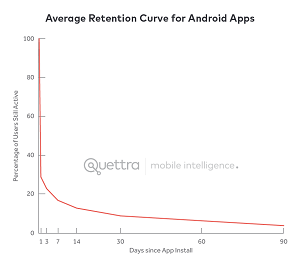News
Google Points to Gamers for Mobile App Success Lessons
- By David Ramel
- March 4, 2016
We hear it's hard for indie devs to make much money on their Google Play wares. The conventional consensus is that Apple's iOS App Store has garnered the more profitable, high-end market for mobile apps in the industry it pioneered. Meanwhile, Google has carved out its own low-end niche catering to more "freemium" apps and beginner, casual developers.
That has given rise to research indicating many solo or small-shop developers fall below the app "poverty line" in generating revenue, especially on the Android platform.
Brand-new research conducted by mobile advertising specialist InMobi shows Android devs trail their iOS and Windows Phone (yes, Windows Phone) counterparts, earning an average of $4,900 in monthly revenue, far below the $8,100 enjoyed by iOS developers and the $11,400 earned by developers targeting Windows Phone (yes, Windows Phone).
Such research has led to advice offered by some experts that mobile developers should focus on e-commerce to make money rather than app stores, and focus on the enteprise as opposed to the consumer market.
 [Click on image for larger view.]
Global Monthly App Revenue, by OS (source: InMobi)
[Click on image for larger view.]
Global Monthly App Revenue, by OS (source: InMobi)
However, for those who aren't in a position to do those things -- or simply don't want to -- Google is continuing to offer tips to help Android programmers make more money. The latest batch of tips advises mobile app devs to look to their gaming brethren for examples to follow. That comes in a blog post this week titled "Find success on Google Play: What app developers can learn from games."
Why gamers?
"There is much common ground between freemium apps and games businesses when it comes to achieving success," said Google Play exec Matteo Vallone in his Wednesday post. "Users are, however, more used to paying for games than apps, stemming from the history of traditional gaming consoles. Moreover, mobile games are also able to easily offer 'virtual goods' across a range of price points to suit every pocket. This means that game developers have had plenty of opportunity to learn about how to improve onboarding, conversion and ultimately the user Lifetime Value (LTV)."
Vallone listed four tips for devs wanting to duplicate the success found by gamers:
- Optimize retention before investing in acquisition.
- Retain users with step-by-step engagement.
- Target the right offers at the right users.
- Offer in-app purchases when users are most likely to spend.
Notice that two of the tips focus on retaining users.
"Retention is king, and retention drives conversion," Vallone said. "For games developers, retention is the key measure of game quality and whether it appeals to players."
 [Click on image for larger view.]
User Engagement for Retention (source: Google)
[Click on image for larger view.]
User Engagement for Retention (source: Google)
It's especially crucial to focus retention efforts on the first seven days after an app install, Vallone said, as many apps are discarded soon after download. Compuware research has shown "Users will not tolerate a problematic mobile app, and will abandon it after only one or two failed attempts," and that "79 percent [of survey respondents] would retry a mobile app only once or twice ifit failed to work the first time."
While that study focused on non-working apps, the story is likely to be similar for apps that work as intended but just don't deliver a satisfying experience.
In fact, Andrew Chen recently revealed some research conducted with mobile intelligence start-up Quettra that indicates "the average app loses 77 percent of its DAUs [daily active users] within the first three days after the install. Within 30 days, it's lost 90 percent of DAUs. Within 90 days, it's over 95 percent."
 [Click on image for larger view.]
Apps Lose 77 Percent of Active Users After Three Days (source: Quettra)
[Click on image for larger view.]
Apps Lose 77 Percent of Active Users After Three Days (source: Quettra)
To increase retention rates, "There are some simple ways to progressively build user engagement," Vallone said. It's important to present a strong story that explains why that app is relevant to the user, while introducing them to key features. Then place features that offer the user value early, so they can be found without much effort."
Interested developers can refer to the blog post for further guidance on tips from Vallone, who also expresses his views in a video on that site, titled, "The rules of the games, for apps."
About the Author
David Ramel is an editor and writer at Converge 360.